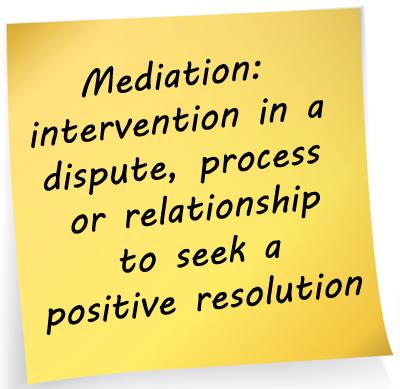|
After six days of intensive training, 13 mediators have been working diligently this semester to develop the process and logistics of the Faculty Association Conflict Mediation Program (FACMP).
During this time, our team has created numerous forms and processes for this program. Specifically, we thought about early steps such as how to plan for when one of our members contacts us to inquire about a mediation up until the final stage of getting to, hopefully, a resolution between both parties.
Listed below, you will find information about the philosophy of conflict mediation, confidentiality and privacy policies and ground rules for a mediation session. This program will become available to all of our members in fall 2015.
Philosophy of Mediation
- Mediation is a neutral process. Neither the mediators nor the Faculty Association are here to take sides in the mediation process or in its outcome.
- No party is here to be judged, find fault or impose a settlement.
- The purpose of mediation is to assist participants in resolving the problem(s) between the parties.
- Mediator(s) have no authority to tell parties what to do or to impose a settlement.
- The mediator(s) role is to assist parties in reaching an agreement.
- You, the parties involved, will control the outcome.
- Mediation is voluntary.
- No mediation is the same. Mediation sessions and conflict resolution is a personal process in which multiple meanings can be taken from the session. As a result, we ask you to have an open mind as you enter this process.
Privacy & Confidentiality
- No one will know that you voluntarily came to mediation other than the co-mediators and the FACMP program coordinator assigned to your session.
- The co-mediators will not disclose or reveal any information to any party including the Faculty Association, the College Administration, Human Resources, and the parties’ immediate supervisor.
- We ask that you keep what is discussed during the mediation session confidential and private.
- The only item kept on file will be the consent form signed by both parties indicating an agreement to go into mediation. This document will be kept in a secure filling cabinet in the Faculty Association office.
- If a written agreement is reached, neither the Faculty Association, nor the co-mediators, will retain a copy of the agreement. Only the parties involved will retain a copy of the signed agreement and will take that with them when the mediation session concludes. Again, to protect confidentiality of all parties involved, we ask that you do not share this with any other party or person.
- Any notes that will be taken by the co-mediators will be destroyed (i.e. shredded) immediately upon the conclusion of the mediation session.
Ground Rules
In order to create a positive, open environment, we ask that you please abide by the following ground rules:
- Allow for everyone to be fully heard as you too will be fully heard.
- No interruptions.
- Be respectful (i.e. no name calling, monitor your nonverbals).
- Remain seated.
- Use paper for notes on points to present or dispute.
- Expect that the other party will make a sincere attempt to find a resolution.
- Silence all cell phones.
- No recording devices will be used.
- The mediators will be taking notes that will be destroyed after the mediation session.
- Each party may take their own respective notes during the mediation session.
- Mediation will last no more than two hours and if another session is needed we will schedule another one that works for both parties.
|
